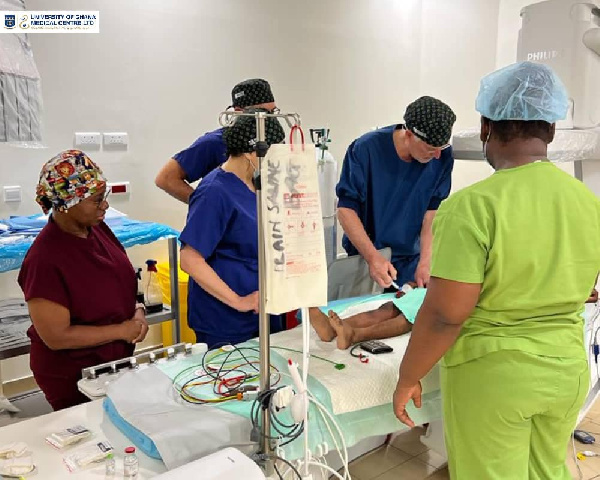The University of Ghana Medical Centre (UGMC) has reported successfully undertaking a historic open-heart surgery over a condition that can cause death in especially children.
The UGMC team collaborated with allies from a German medical NGO to undertake the procedure known as Pulmonary Valvuloplasty on three Ghanaian children, recording a 100% success at the end of the surgery.
The condition impedes blood flow from the right heart into the lungs and can eventually cause breathlessness, heart failure and other complications due to inadequate oxygen supply to the body if not addressed in a timely manner.
According to a May 21, 2023 statement shared on their social media handles, the surgery took place between May 15 – 16, 2023.
The statement noted that: “The UGMC team consisted of Prof Nana-Akyaa Yao who is the Clinical Lead for Paediatric Cardiac Services at the UGMC together with staff from the Centre’s paediatric surgical and Cath Lab units.
“The Global Health Care Team consisted of its president and founder, Prof Charles Yankah, Dr Regina Bokenkanp from Leiden University Medical Centre (LUMC) and a few other experts in the field.”
Read UGMC’s full statement below:
Historic Congenital Heart Procedures performed at the University of Ghana Medical Centre Ltd
The University of Ghana Medical Centre Ltd (UGMC) in collaboration with Global Heart Care (A German-based philanthropic agency) have performed minimally invasive cardiac interventions in children known as Pulmonary Valvuloplasty for the first time at the UGMC.
The condition impedes blood flow from the right heart into the lungs and can eventually cause breathlessness, heart failure and other complications due to inadequate oxygen supply to the body if not addressed in a timely manner.
The procedures took place on 15th and 16th May 2023 and were performed on three Ghanaian children who had been diagnosed with severe congenital heart valve defects from birth known as pulmonary stenosis. Their conditions were repaired by minimally invasive venous access at the groin. With a puncture into the vein in the groin, the paediatric cardiologists navigated catheters with deflated balloons at their tips into the heart,under X-ray guidance. The deflated balloons at the tip of the catheters were inflated to open the tight pulmonary valves.
This would be the standard of treatment in developed health systems and can be used to treat other suitable cardiac defects. The greatest benefit being the heart is not opened and the patients have a short hospital stay.
The three paediatric patients, were discharged 1-2 days after the procedure as opposed to the 7- 10days required for open-heart surgeries.
The UGMC team consisted of Prof Nana-Akyaa Yao who is the Clinical Lead for Paediatric Cardiac Services at the UGMC together with staff from the Centre’s paediatric surgical and Cath Lab units.
The Global Health Care Team consisted of its president and founder, Prof Charles Yankah, Dr Regina Bokenkanp from Leiden University Medical Centre (LUMC) and a few other experts in the field.
This high tech interventional paediatric cardiology procedures were technically supported by Philips engineers, the Bioengineering and ICT staff of UGMC.
This is a milestone in paediatric cardiology in Ghana which will motivate women and young physicians, nurses in the medical field to be integrated into high tech heart disease treatment processes with less trauma and quick recovery.
Prof Nana-Akyaa Yao who was very elated about the success of these procedures said children with heart problems in Ghana are entitled to the best standards of cardiac care and being able to conduct these procedures at The UGMC sets the pace to pursue international standards of care.
The CEO of the UGMC, Dr Darius Osei stated that he was excited that collaborations such as the one the Centre had with UK based Arrhythmia Alliance Hearts of Ghana Charity had yielded highly successful outcomes and paved the way for similar collaborations.
Dr Osei indicated that the Centre plans to firm up these collaborations to position UGMC as a triaging and training point for these heart conditions upon referral from other smaller facilities locally and within the sub-region o that these high-tech medical interventions can be performed for patients periodically.

